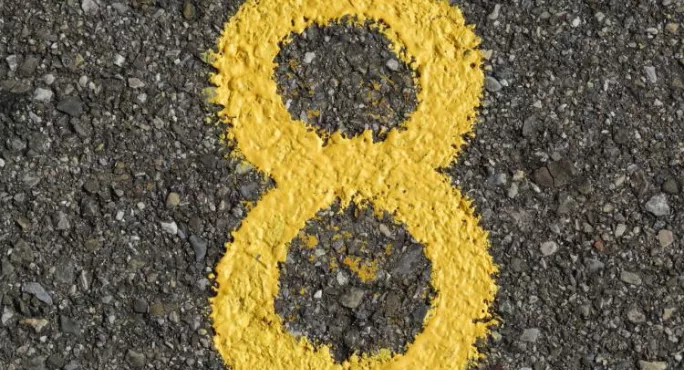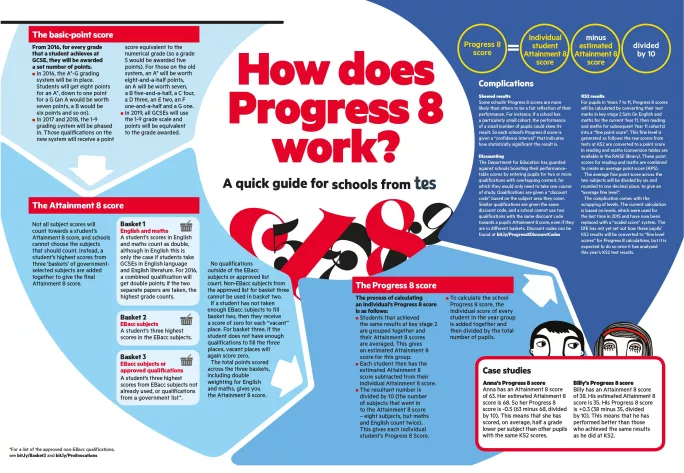
- Home
- Progress 8: What you need to know
Progress 8: What you need to know

The Department for Education will publish the national secondary school league tables next week, based on provisional data from this summer’s GCSE results.
Schools will finally be able to compare their provisional score for Progress 8 - the government’s headline secondary school accountability measure - with other schools across the country.
And they will also have their scores in time for the secondary school application deadline this month.
Here are some of the biggest questions being asked about the measure:
How much attention should be given to provisional scores?
The provisional Progress 8 scores should be treated with caution, as the final Progress 8 scores do not come out until January.
The provisional data will not include any re-marks, and it is likely that there will be more this year compared with the year before, due to the GCSE reforms - so this could change the scores.
And for schools that have already seen their provisional scores through the DfE’s checking website, these may change after an error was identified in the data last week. Pupils who left their schools years ago were included in provisional data - but the DfE has now said these will be removed before next week.
Why do some heads already know how their results compare with other schools?
On GCSE results’ day, schools used to know immediately how they had performed. But under Progress 8, they have to wait until the DfE releases their provisional scores a month later. And they have to wait even longer to find out how they’ve performed compared to schools in the country.
This can be nerve-racking for headteachers who are concerned about the security of their jobs.
However, this year, for the first time, the Association of School and College Leaders was able to provide its members with Attainment 8 estimates - to help them work out their Progress 8 scores - just days after GCSE results’ day.
More than 1,000 secondary schools shared their results anonymously to work out averages. Once they had worked out the Attainment 8 estimates, these were shared with ASCL members.
Duncan Baldwin, deputy director of policy at ASCL, said: “I think it is time that we shouldn’t just rely on the DfE to do our accountability.
“It means you can have a better sense of conversation with your school governors. You could be much more confident about. It also stops schools from doing the wrong thing with this measure, which is to compare it to last year’s averages. You can’t really compare it to last year.”
Is it seen as a fairer measure?
Schools are no longer judged on how many of their pupils achieve five A* to C grades at GCSE. Progress 8 instead takes into account the achievements of pupils of all abilities.
It was introduced to stop schools targeting disproportionate resources at pupils on the C/D borderline.
The measure, which was designed to be fairer, has been welcomed as a step in the right direction - but schools with large numbers of lower-ability pupils are still disproportionately penalised by it.
When are the criticisms of Progress 8 going to be addressed?
There have been teething problems with Progress 8 after it was introduced for schools last year.
Earlier this year, Tes revealed that headteachers were concerned about the damaging impact that just a handful of pupils - with extremely negative scores - were having on their schools’ scores.
Schools were worried they’d be judged unfairly for extreme circumstances outside of their control - such as pupils who may have been absent from their exams due to illness or bereavement.
In July, the DfE said it would make a change to the Progress 8 methodology in light of the concerns.
This will not happen until next year - but the government has said it will make sure that Ofsted, regional schools commissioners and local authorities are aware of the issue. And it says the impact of these pupils will be taken into account when a school is below the floor standard or coasting.
Do parents understand Progress 8 scores?
Despite having been in place for a year, parents still are confused by the accountability measure.
A survey by the DfE found that three-quarters of parents and carers had not heard of Progress 8. And of those who had heard of Progress 8, less than a fifth (19 per cent) of parents and carers understood how it worked.
Ahead of the secondary school application deadline later this month, schools will want to share their provisional Progress 8 scores with parents.
But it is much harder to grasp what the scores - which are usually between -1 and +1 - mean, compared to the old five A* to C measure, which more parents could relate to.
Mr Baldwin says the number is “tricky” for the general public to understand.
He said: “One of the things I think we can do to help everybody is not to think about that number, but to think about what it means for pupils.
“If you look at the percentage of pupils in your school that made above average progress - or in other words got a positive progress 8 score - that tells the same story nationally but it brings this quite arcane measure back down to, ‘How do people do typically in this school?’”

Register with Tes and you can read five free articles every month, plus you'll have access to our range of award-winning newsletters.
Keep reading for just £4.90 per month
You've reached your limit of free articles this month. Subscribe for £4.90 per month for three months and get:
- Unlimited access to all Tes magazine content
- Exclusive subscriber-only stories
- Award-winning email newsletters
You've reached your limit of free articles this month. Subscribe for £4.90 per month for three months and get:
- Unlimited access to all Tes magazine content
- Exclusive subscriber-only stories
- Award-winning email newsletters



